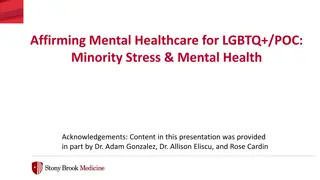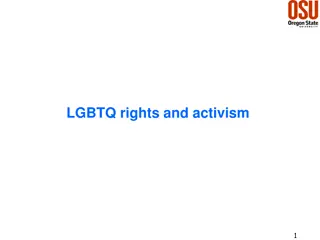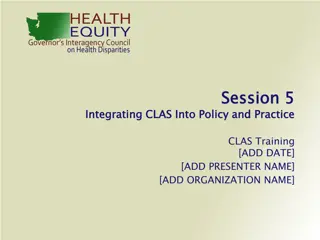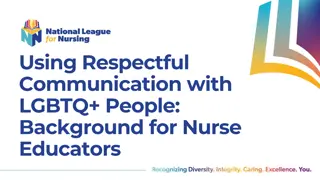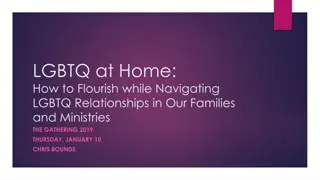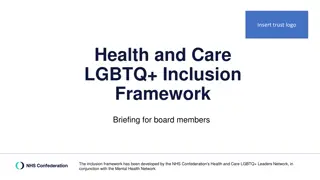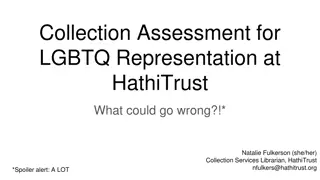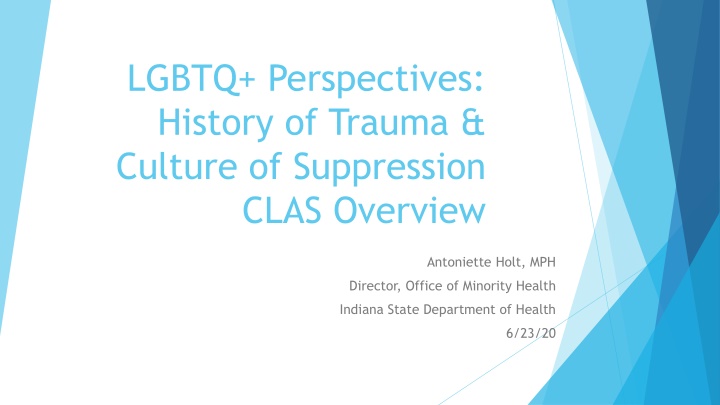
Culturally and Linguistically Appropriate Services (CLAS)
Explore the importance of Cultural Competence, National CLAS Standards, and the implementation of CLAS in healthcare to provide effective, equitable, and respectful care to diverse populations. Learn how CLAS fosters respect, responsiveness, and improves quality of services to promote health equity and eliminate disparities.
Download Presentation

Please find below an Image/Link to download the presentation.
The content on the website is provided AS IS for your information and personal use only. It may not be sold, licensed, or shared on other websites without obtaining consent from the author. If you encounter any issues during the download, it is possible that the publisher has removed the file from their server.
You are allowed to download the files provided on this website for personal or commercial use, subject to the condition that they are used lawfully. All files are the property of their respective owners.
The content on the website is provided AS IS for your information and personal use only. It may not be sold, licensed, or shared on other websites without obtaining consent from the author.
E N D
Presentation Transcript
LGBTQ+ Perspectives: History of Trauma & Culture of Suppression CLAS Overview Antoniette Holt, MPH Director, Office of Minority Health Indiana State Department of Health 6/23/20
Cultural Competence Cross et al. (1989) definition. Cultural competence requires that organizations: have a defined set of values and principles, and demonstrate behaviors, attitude policies and structures that enable them work effectively cross-culturally. (1) value diversity, (2) conduct self-assessment, (3) manage the dynamics of difference, (4) acquire and institutionalize cultural knowledge, and (5) adapt to the diversity and cultural contexts of the individuals, families and communities
What Is CLAS? Culturally and Linguistically Appropriate Services (CLAS) is a way to improve the quality of services provided to all individuals, which will ultimately help reduce health disparities and achieve health equity
National CLAS Standards 15 action steps intended to advance health equity, improve quality, and help eliminate health care disparities by providing a blueprint for individuals and health and health care organizations to implement culturally and linguistically appropriate services.
Culturally and Linguistically Appropriate Services CLAS is about respect and responsiveness CLAS is a way to improve the quality of services provided to all individuals Respect the whole individual our populations we are serving Respond to the individual s or population s health needs and preferences.
Implementing CLAS will enable your staff to: Gain knowledge about cultural values and beliefs of the patient and apply that knowledge in a health care context. Interact effectively with people whose cultures and belief systems are different than your own. Provide quality care that is respectful and nonjudgmental. Deliver health care, services, and supports in the primary languages spoken be patients/clients and their families Identify and respond effectively to the preferences and needs of populations served.
Principal Standard 1) Provide effective, equitable, understandable and respectful quality care and services that are responsive to diverse cultural health beliefs and practices, preferred languages, health literacy and other communication needs.
Governance, Leadership, and Workforce 2) Advance and sustain organizational governance and leadership that promotes CLAS and health equity through policy, practices and allocated resources. 3) Recruit, promote and support a culturally and linguistically diverse governance, leadership and workforce that are responsive to the population in the service area. 4) Educate and train governance, leadership, and workforce in culturally and linguistically appropriate policies and practices on an ongoing basis.
Communication and Language Assistance 5) Offer language assistance to individuals who have limited English proficiency and/or other communication needs, at no cost to them, to facilitate timely access to all health care and services. 6) Inform all individuals of the availability of language assistance services clearly and in their preferred language, verbally and in writing. 7) Ensure the competence of individuals providing language assistance, recognizing that the use of untrained individuals and/or minors as interpreters should be avoided. 8) Provide easy-to-understand print and multimedia materials and signage in the languages commonly used by the populations in the service area.
Engagement, Continuous Improvement and Accountability 9) Establish culturally and linguistically appropriate goals, policies, and management accountability, and infuse them throughout the organizations planning and operations. 10) Conduct ongoing assessments of the organization s CLAS-related activities and integrate CLAS-related measures into assessment measurement and continuous quality improvement activities. 11) Collect and maintain accurate and reliable demographic data to monitor and evaluate the impact of CLAS on health equity and outcomes and to inform service delivery.
Engagement, Continuous Improvement and Accountability Cont. . 12) Conduct regular assessments of community health assets and needs and use the results to plan and implement services that respond to the cultural and linguistic diversity of populations in the service area. 13) Partner with the community to design, implement and evaluate policies, practices, and services to ensure cultural and linguistic appropriateness. 14) Create conflict- and grievance-resolution processes that are culturally and linguistically appropriate to identify, prevent and resolve conflicts or complaints. 15) Communicate the organization s progress
Culturally and Linguistically Appropriate Services CLAS helps make your services: Respectful Understandable Effective Equitable








